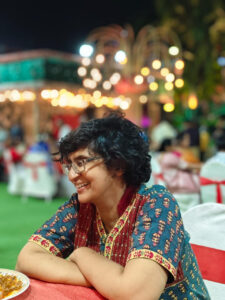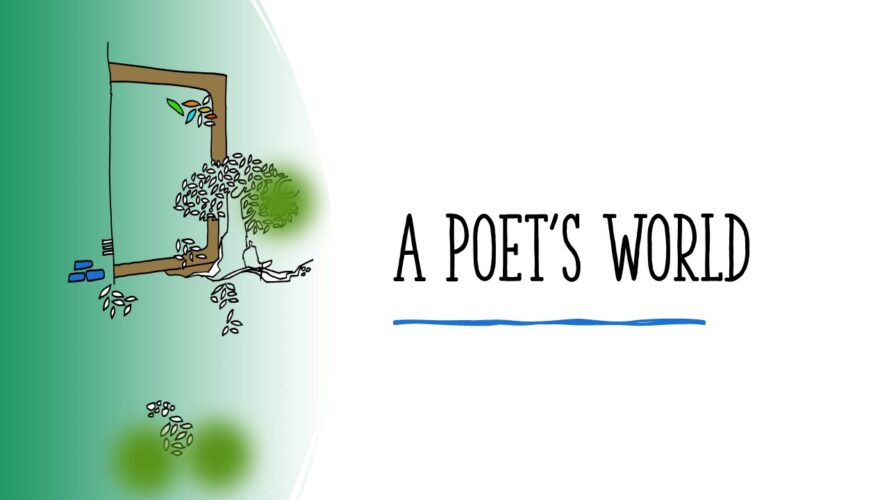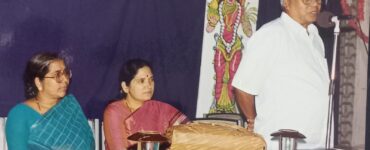Nandini Dhar is a bi-lingual poet who writes in English and Bangla. She is the author of five poetry collections in Bangla and two in English. Her poems have also been anthologized in India and abroad. Nandini lives and works in Kolkata, India.
When did you first write a poem? Can you recall a specific moment from the experience?
I think, I was around 16. I had passed my tenth-class exams, had opted for Humanities. I didn’t do too badly in my tenth-class exams (the first public exam for most in my generation). So, the decision to opt for Humanities, was a kind of middle-class Indian blasphemy. I did enjoy most of my classes in 11 and 12 th grades. I could finally concentrate on the disciplines that I loved — History, Literature, Social Sciences. But I was a precocious teenager (the right Bangla word would be pod-paaka, which unfortunately does not have in translation in English, like most curse words), who had grown up in a political household. So, what I knew about politics and history and literature by that age, far surpassed what we were being taught in the classes. For example, I already knew about political disappearances, about custodial torture and sexual violence. In the middle-class Bengali society, just emerging out of the shadows of Naxalbari, these were not the things that were talked about in “polite” middle-class settings. Probably because almost every middle-class family could talk about at least one such incident happening in their midst. Anyways, I remember, sitting at one of the back rows of the class, and writing poems. Really awful ones that were quite long and boring. I also remember reading quite a few books of poems this way, Pablo Neruda’s Residence on Earth being one of them.
In some ways, then, poetry appeared to me as a form of rebellion against academic drudgery. Poetry made it possible for me to enact my alienation from the classroom at large. I think, that’s why, even now when I am a professor, I have a certain kind of weakness for the backbenchers, the ones who are alienated from whatever is going on in the classroom. Because, I know, behind every such alienated student, there lies a deeper story. Every alienated child in the classroom is, to use Toni Morrison’s words, an artist without an art-form. Will all of their stories become poems? I don’t know. Possibly not. But, surely, they can, if conditions are provided for them to thrive.
Tell us about your journey till now, how has your writing style evolved over time?
So far, I have published 2 full-length books of poems in English, and 2 chapbooks, and 5 books of poems in Bangla. My first writing projects, in lots of ways, were critical-feminist interrogations of domesticity and domestic ideologies, of ideologies of middle-class Bengali girlhood, of relationships between women, often written using a form of domestic fabulism. However, as a poet, I was being overtly identified as a poet/writer of domesticity — a “domestic poet,” so to say. Not that I cared too much, but I also needed a certain kind of space out. I don’t think I am done writing about these themes yet, but it was important for me to move out for a while. For as long as I have been reading poetry, I have been attracted to the traditions of what I term “public lyric” — a form of writing the lyric that takes on big, public issues in complex ways. Being able to write “public lyric” also lets you into that mythical space called “universal,” which, obviously, writing about domesticity doesn’t (can you read the irony in here?). I won’t lie; it has been difficult for me to write such public lyrics. Precisely because, my relationship to the public worlds — the academic worlds, the writing worlds, the activist worlds, the worlds of the streets — have never been easy by any means. This, in spite of the fact that I was born amidst a fair amount of cultural and some amount of economic privilege. This because of the fact that ever since I was a child, I was encouraged by the adults around me to take up space in the public world. Yet, I have never felt that I own the public world to that extent that I can write lyric poems about them. Maybe this is precisely why there are so few women globally who write “public lyrics”? And even when they do, women’s “public lyrics” tend to become something else? My last three books in Bangla happen to be efforts in writing “public lyric” as a woman. In these “public lyrics,” I don’t erase gender, I don’t erase my gendered experiences in the public world. My last book in English (rebought fascimilies), which came out in 2024, is also an attempt to engage in writing public lyrics. The English-language manuscript I am currently working on, also happens to tread similar grounds.
Can you name a recurring image or metaphor in your work, and explain its significance?
In my first book of poems, Historians of Redundant Moments, I have repeatedly used toys — especially dolls. I have used the rooms, the walls, the home/domestic spaces at large. These objects and spaces have been used to create a sense of space and place. In that sense, they are very real, concrete, material entities, used to write a children’s world, women’s world. But, they are also metaphors. Of domesticity, of capital’s reconstruction of domesticity, the claustrophobia of femininity. In rebought fascimiles, I use the streets, the idea of language, the city-scapes. Often, these spaces exist as diametric opposites. One for a certain kind of closeness, another for public openness. Although, I don’t always make it explicit, when I write the streets, I am never too far away from the gendered metaphor. How does a woman claim and write a city — is a question I am always asking. In the same way, in my writings of both the home and the street, I am never too far away from the classed metaphor either. I go back again and again to Friedrich Engels’ Conditions of the Working Class in England, written before Engels began his collaboration with Marx. And, I try to keep in mind the fact, as Engels reminds us again and again, the modern city is a script of the class war that capital wages on human lives every single day.
What’s your writing routine, ritual or process?
I never had the luxury to write poems in and through a very fixed routine. Neither did I ever have the luxury to develop a full-blown writing ritual. Now that I have an extremely demanding job, I write very early in the morning, while drinking my morning cup of tea or coffee. I try to read a poem or two, dash of a line or two of my own, to be revised later. There have been occasions when I have written a line or two in the midst of faculty meetings, in between successive student conferences, while being in the run. When I am lucky to have some free time to myself, I love to take myself to a cafe, read poems by others, write my own. But, it’s a luxury I can’t quite afford on a regular basis. So, really, whatever poems I have been able to write, have been written in and through stolen time.
How do you see yourself in the intersection of the world we live in and the poems you write in your solitude? Do you think poetry has the power to influence social change?
If I didn’t believe that poetry did certain things to influence social change, I wouldn’t have tried to write it, I guess. But, it’s also not a one-to-one process, it’s a mediated process, a complicated process. I see my poems as documenting — in whatever mediated ways, whatever incompetent ways — the world we live in. The times we live in. But, more than that, I like the fact that poetry isn’t as amenable to the institution called market, as many other genres and forms are. I can be irresponsible in my poems, therefore. My poems do not put food on my table. Therefore, in my poems, I show no gratitude to anyone. Poetry allows me to be in that forever j’accuse mode. In my poems, I am the perpetual namakharam.
*









Add comment